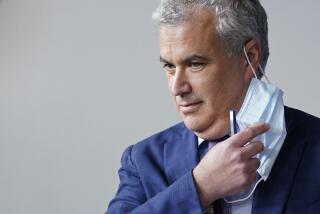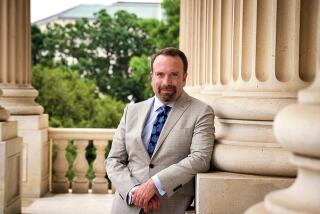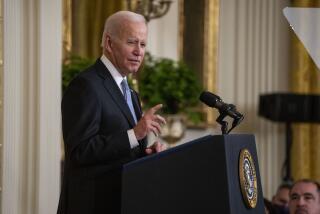No White House Shake-Up Near, Bush Declares
- Share via
FRESNO — President Bush on Saturday denounced as “pure fiction” and “simply nuts” reports that a shake-up of the troubled White House staff is near, but he held out the possibility that “we’ll have some changes later on.”
His remarks reflected the turmoil that continues under White House Chief of Staff Samuel K. Skinner, and in the President’s reelection campaign. They marked the first time Bush has suggested that the White House operation he overhauled less than six months ago might not last through the campaign.
He made the comments in an interview with senior executives of Times Mirror Co. and the Los Angeles Times aboard Air Force One en route from Los Angeles to Fresno.
Bush also said that while Los Angeles police “are sore at me,” he stands by his expression of dismay over the visual impact of the videotaped Rodney G. King beating.
“I can understand their Angst because these people had a trial,” he said. Three police officers were found not guilty of charges in connection with the beating and the fourth was acquitted on all but one charge, on which he faces a new trial.
“But I also saw what I saw, I mean, and felt what I felt,” Bush said, acknowledging that his comments had “triggered particular ire” in Los Angeles Police Chief Daryl F. Gates, of whom Bush has spoken warmly in the past.
Bush said in the interview he would not yet publicly size up his likely campaign opponents--Democratic Gov. Bill Clinton of Arkansas and Texas billionaire Ross Perot--even though a senior aide described him as eager to do so.
“I’ve got very strong feelings on it, but I made a decision, and that is to not discuss Clinton or Perot,” Bush said. “I have very, very strong convictions about each of them. I know both of them.”
But for the time being he will avoid getting “into that mire, which they want to put me in, both of them attacking me almost every day.”
He said his reluctance stemmed from concern that openly political attacks would make it difficult “to accomplish something for the country.”
But it also reflected the political decision, aides have said, to spend the coming weeks trying to rebuild voters’ impressions of him after the steep fall he took in public opinion polls when the economy slipped into recession. Sharp attacks on Perot and Clinton could divert attention from the focus they would like to put on Bush’s record, the aides have said.
The interview was conducted in the Air Force One conference room by Robert F. Erburu, chairman of the board of Times Mirror Co., the parent company of the Los Angeles Times; David Laventhol, Times publisher and chief executive officer, and Shelby Coffey III, Times editor and executive vice president.
Wearing the blue jacket he frequently dons while on board, Bush appeared relaxed as he ranged over such topics as the riots, the prospects for economic recovery and, among other things, the “amazing” predilection of Ranger, one of his two English springer spaniels, to wake him precisely at 5 a.m.
Occasionally, he tapped the handset of a telephone with an open palm for emphasis, or looked at others around the table, including California Gov. Pete Wilson, Sen. John Seymour (R-Calif.), National Security Adviser Brent Scowcroft and White House Press Secretary Marlin Fitzwater.
The President, who on Saturday completed a second post-riot visit to Los Angeles, touring South-Central, said his initial reaction was one of “amazement and horror and wonder and why-the-wanton-destruction.”
He said he was struck by the “wide streets, relatively neat front yards and obvious pride in the little houses along there,” because he associated such urban troubles with “high buildings and tenements and hopelessness.”
“This is open and rather pretty,” he said.
Bush, who said he would likely make a return inspection visit, also said the riots would put urban affairs “front and center” among issues in the presidential campaign.
As he has in public, Bush voiced satisfaction with the federal government’s performance in delivering relief to the riot victims, but he expressed exasperation that those programs requiring congressional approval are not moving more quickly through the House and Senate.
“I’m pleased with the things I can do by signing a piece of paper or waving a wand or telling somebody to get out and do something,” he said. “But I am not pleased with the progress in the Congress.”
The President said he found “very troubling” the argument that merchants in Koreatown, singled out for attack during the riots, had not been returning the benefits of their profitable businesses to the local community. “Those wounds have to be healed,” Bush said.
The President portrayed himself as caught between demands that the federal government spend more money on urban problems and the pressure to bring down the record budget deficit.
“Everybody is saying to me, ‘you’ve done a lousy job on the defic” he said. “And I’m saying, ‘yes.’ Then they’re coming saying, ‘but we need more money for this and that and the other thing.’ And that’s where you run into a real dilemma.”
At the same time, he suggested the political calendar limited what he could accomplish because “anything you do or say is pure politics from now on.” He also said, however, that “I think we’ve got a window here to accomplish certain things for the cities.”
In the past, Bush has expressed frustration over the public’s pessimism about the economy even as government statistics indicate it has turned around, with interest rates and inflation remaining at acceptable levels.
Although he predicted that such negative views will eventually disappear, he said: “There’s not a hell of a lot I can do about it, and I’ve got to be careful that I don’t oversell and try to make everybody think everything is fine when I know very well it’s not.”
Acknowledging that the economy was rebounding at a slower pace than in past recoveries, he said it would be inappropriate for him to predict more robust activity, and instead said “our experts” anticipate such a trend.
Bush expressed a degree of frustration with the constraints that security considerations put on his lifestyle, although he said they were dictated by legitimate concerns.
“You can’t stop the car and jump out and go to see a family standing in their front yard as you drive through South-Central,” he said. Nor, he said, can he browse through stores.
“I would love to have gone out last night maybe for a Chinese dinner; could very well have done it,” he said. But he said the Secret Service would have asked for 30 minutes advance preparation. “When I’d gotten to the restaurant there would be 20 guys standing around throwing other people back in one corner.
“It just goes with the territory. So we stayed home, had a martini with Scowcroft.” Bush spent the evening in the Sheraton Grande Hotel.
In discussing his daily routine, beginning with Ranger’s 5 a.m. greeting, Bush said he peruses six newspapers--the Washington Edition of The Times, the Washington Post, the New York Times, the Washington Times, USA Today and the Wall Street Journal.
In addition, he said, he gets the tabloid New York Post and New York News, and “you automatically look for the gossip section . . . A6--that’s the Post page.”
Items that catch his attention in the various newspapers are noted on blue-bordered paper and the notes are dispatched to aides--often apparently reflecting a flare of presidential anger--after he walks to the Oval Office around 7 a.m.
If he were back in Washington, for example, he said he would have reacted to a Washington Post story Saturday morning about problems in his staff by “fruitlessly looking around, ‘Who leaked this story?’ But I vent--I get that out of my system and then can make more reasonable decisions and approaches to issues later on.”
Asked whether he thought he had changed the office of the presidency, he said “I’ll be able to give you a better answer four years from now.”
As for its impact on him, he said he came to office determined to “never complain about the loneliest job in the world . . . plenty of problems, but I have good people helping me . . . .”
“It doesn’t get me down,” he said, although he observed “this has not been a particularly pleasant period for me.”
“I think I’ve set a record for negative (news) coverage,” he added.
As vice president, he said, he had few decisions to make, but now, “when you make the decisions, you, I think, are more inclined to contemplate the human dimensions to questions. I think I have a more seasoned judgment on people and on policy.”
In discussing his governmental experience, Bush is walking a difficult path this election year, with voters in a sour mood about elected officials and polls finding that 80% of voters believe the country is on the wrong track. Perot is exploiting those factors and Clinton is also likely to emphasize them by stressing his lack of Washington experience.
The President said he would hold off attacking the two likely opponents until after the Republican National Convention in August, although he acknowledged that “some of our people” question this approach.
“There’s plenty of time,” he said. “If you all need help from me in defining the opponent, I’ll be glad to accommodate. But not now.”
And eventually, Bush said, reflecting the pitch that his aides hope will reverse the anti-Washington mood, the campaign will come down to such questions as:
“Who do you want to make the decisions about war and peace? Who do you want to handle the very complicated questions about nuclear problems that still exist? Levels of defense versus domestic needs?
“I like to think that will be an ingredient that is not on the radar screen yet,” he said, noting that although the Cold War ended and “we’ve bashed communism,” such “highly complex stuff” as ethnic rivalries remain to create international instability.
The interview occurred at a time when Bush is dogged again by reports that his White House is functioning inefficiently at best and, at worst, is in disarray.
Of reports about a shake-up, however, Bush said, without the anger in his voice that the words might suggest: “Somebody is just printing obscenities.”
“It’s pure fiction--those stories--pure fiction. Periodically they crop up. And sometimes there’s a kernel of truth. . . . It’s the No. 1 game--who’s up, who’s down, who’s winning, who’s losing, disarray of order,” he said. He added that similar stories were written four years ago about his presidential campaign organization.
“I’ve got . . . great confidence in Sam Skinner,” Bush said. “It’s not been easy coming in there at a very difficult time.” Skinner took over as chief of staff in mid-December, replacing John H. Sununu, and was immediately plunged into the task of reorganizing the White House and coordinating its work with the already lagging reelection effort.
The troubling problems may appear similar to those that gripped the President’s aides last autumn before Sununu’s departure.
But the situation has assumed a particular urgency because the complaints that the staff is unable to demonstrate the creativity and energy required in a presidential campaign are occurring at a time when Bush is facing ever-greater political challenges and Perot has overtaken him in public opinion polls in a number of crucial states, including California and Texas.
Rumors of a change in the making circulated on both coasts at the end of the week. By one account, in U.S. News & World Report, a White House announcement was pending on a wholesale shuffling of the players that would see Secretary of State James A. Baker III return to the White House as chief of staff, the post he held in the first four years of the Ronald Reagan Administration.
State Department spokeswoman Margaret Tutwiler played down any suggestion that Baker was about to leave his post, and said that Bush and Baker, two old friends, had not discussed the subject.
Another scenario would leave Baker at the State Department, but Dick Cheney, who was a White House chief of staff under Gerald R. Ford, would return to that post--a course that some Republicans in Congress have been advocating for a month.
The Washington Post report to which Bush referred had Robert A. Mosbacher, a longtime confidant of the President who is the general chairman of the Bush/Quayle campaign organization, urging that Skinner be replaced by Baker.
Asked specifically whether Mosbacher had told him Skinner should be replaced, Bush replied “absolutely not” as he boarded his limousine at the Fresno airport. He said he was glad to be asked about the report, and, slamming his hand on the automobile’s roof for emphasis, he repeated, “absolutely not.”
Yet, one source close to the White House acknowledged that Mosbacher, who like Baker is one of Bush’s oldest friends, could convey such an idea without specifically spelling it out, and had indeed reviewed his complaints with Bush in the last few days.
And others close to Bush have been saying that while no such change is about to be made, if Bush’s political standing does not soon improve, he will have no choice but to make a shift certain to involve Skinner, in an effort to bring fresh blood to the White House and set its operations on a smoother path.
* WETLAND PLAN: The White House announces a program to restore cultivated farmland to its original condition as wetland. A4
More to Read
Get the L.A. Times Politics newsletter
Deeply reported insights into legislation, politics and policy from Sacramento, Washington and beyond. In your inbox twice per week.
You may occasionally receive promotional content from the Los Angeles Times.










